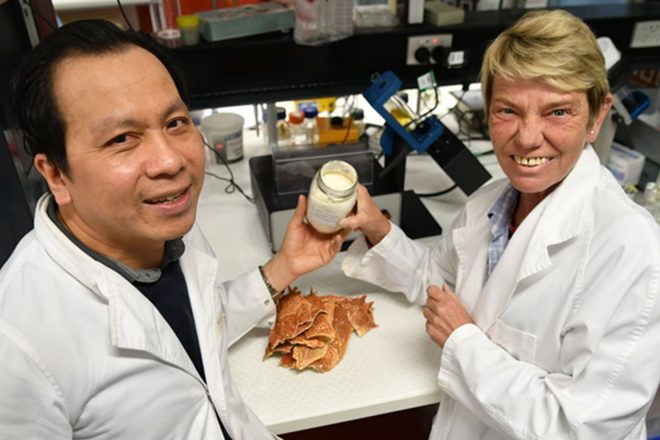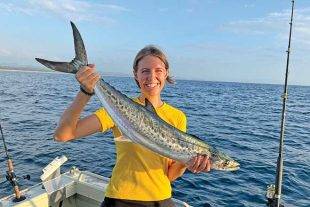AS exploitation of wild fisheries and marine environments threaten food supplies, Flinders University scientists are finding sustainable new ways to convert biowaste, algal biomass and even beached seaweed into valuable dietary proteins and other products.
In one of several projects underway at the Flinders Centre for Marine Bioproducts Development, researchers are looking to extract value from crayfish shells and other marine waste via a ‘green’ fluidic processing machine developed at the university. Professor Kirsten Heimann said millions of tonnes of sea catches produce by-catch, shells, bones, heads and other parts wasted during the processing of marine and freshwater species.
“As world populations grow, so will demand for dietary proteins and protein-derived products and this cannot be met using traditional protein sources,” Prof Heimann said. Seafood processing by-products and microalgae are promising resources that can fill the demand gap for proteins and protein derivatives.
Flinders University new publication co-author Trung Nguyen said in the paper published in Marine Drugs: “These biomaterials are a rich source of proteins with high nutritional quality while protein hydrolysates and biopeptides derived from these marine proteins possess several useful bioactivities for commercial applications in multiple industries.
“Efficient utilisation of these marine biomaterials for protein recovery would not only supplement global demand and save natural bioresources but would also successfully address the financial and environmental burdens of biowaste, paving the way for greener production and a circular economy.” Value-adding also looks promising, with many of the bioactive protein-derived products gaining attention to promote human health including in drug discovery, nutraceutical and pharmaceutical developments.
Estimates of the commercial value of these therapeutic protein-based products in 2015 was around $A240 billion and is predicted to reach $A365 billion in 2021, leading to a two-fold increase in demand of protein-derived products. Globally, 32 million tonnes of SPBs are estimated to be produced annually, which represents an inexpensive resource for protein recovery, while technical advantages in microalgal biomass production would yield secure protein supplies with minimal competition for arable land and freshwater resources.
This comprehensive review article analyses the potential of using SPBs and microalgae for protein recovery and production critically assessing the feasibility of current and emerging technologies used for the process development. The nutritional quality, functionalities and bioactivities of the extracted proteins and derived products, together with their potential applications for commercial product development, are also systematically summarised and discussed in the free online paper.
The Flinders research team aims to provide sustainable solutions and a strong business case for expanding Australia’s marine bioproducts industry to become internationally competitive and attractive to investors and export-oriented markets.
 Bush 'n Beach Fishing Magazine Location reports & tips for fishing, boating, camping, kayaking, 4WDing in Queensland and Northern NSW
Bush 'n Beach Fishing Magazine Location reports & tips for fishing, boating, camping, kayaking, 4WDing in Queensland and Northern NSW









